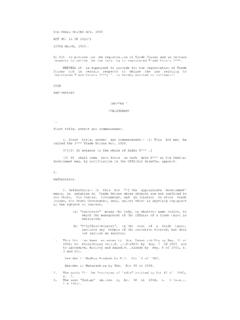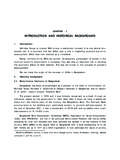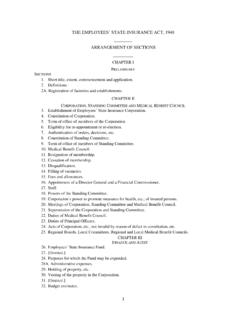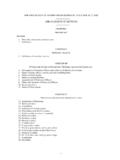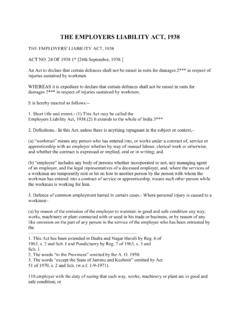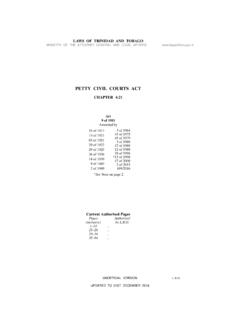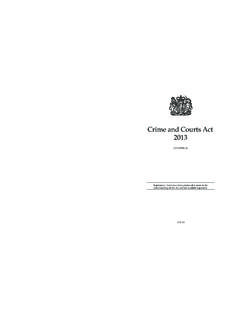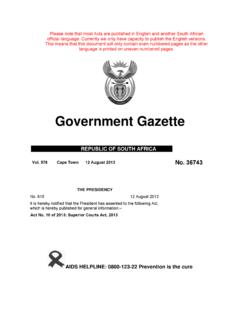Transcription of THE FAMILY COURTS ACT, 1984 ACT NO 66 OF 1984
1 1 THE FAMILY COURTS ACT, 1984 ACT NO. 66 OF 1984 [14th September, 1984.] An Act to provide for the establishment of FAMILY COURTS with a view to promote conciliation in, and secure speedy settlement of, disputes relating to marriage and FAMILY affairs and for matters connected therewith. BE it enacted by Parliament in the Thirty-fifth Year of the Republic of India as follows: CHAPTER I PRELIMINARY 1. Short title, extent and commencement. (1) This Act may be called the FAMILY COURTS Act, 1984. (2) It extends to the whole of India except the State of Jammu and Kashmir. (3) It shall come into force on such date1 as the Central Government may, by notification in the Official Gazette, appoint, and different dates may be appointed for different States.
2 1. This Act shall come into force in (i) Union territory of Andaman and Nicobar Islands on 19th November, 1986, vide notification No. 79/22/86, dated 19th November, 1986, Gazette of India, Extra., Pt. II, Section 1. (ii) Madhya Pradesh on 19th November, 1986, vide notification No. 79/6/86, dated 14th November, 1986, Gazette of India, Extra., Pt. II, Section 1. (iii) Uttar Pradesh on 2nd October, 1986, vide notification No. 79/11/86-Jus., dated 4th September, 1986, Gazette of India, Pt. II, Section 1. (iv) Delhi on 19th November, 1986, vide notification No. 863(E), dater 18th November, 1986, Gazette of India, Extra., Pt. II, Section 3 (ii).
3 (v) Maharashtra on 1st December, 1986, vide notification No. 944(E), dated 5th December, 1986, Gazette of India, Extra., Pt. II, Section 3(ii). (vi) Karnataka on 25th May, 1987, vide notification No. 685(E), dated 15th May, 1987, Gazette of India, Extra., Pt. II, Section 3(i). (vii) Orissa on 1st May, 1989, vide notification No. 321(E), dated 27th April, 1989, Gazette of India, Extra, Pt. II, Section 3(ii). (viii) Kerala on 21st October, 1989, vide notification No. 79/5/86, dated 17th October, 1989, Gazette of India, Extra., Pt. II, Section 1. (ix) Goa on 16th April, 1990, vide notification No. 328(E), dated 12th April, 1990, Gazette of India, Extra., Pt. II, Section 3(ii).
4 (x) Union territory of Pondicherry on 1st May, 1987, vide notification No. 459 (E), dated 29th April, 1987, Gazette of India, Extra, Pt. II, Section 3(i). (xi) West Bengal on 1st November, 1991, vide notification No. 79/12/86-Jus., dated 1st November, 1991, Gazette of India, Extra., Pt. II, Section 1 (E). (xii) Assam on 2nd October, 1991, vide notification No. 79/2/86 Jus., dated 30th November, 1991, Gazette of India, Extra., Pt. II, Section 1 (E). (xiii) Bihar on 10th December, 1991, vide notification No. 838(E), dated 6th December, 1991, Gazette of India, Extra., Pt. II, Section 3(ii). (xiv) Manipur on 3rd February, 1992, vide notification No. 91(E), dated 30th January, 1992, Gazette of India, Extra.
5 , Pt. II, Section 3(ii). (xv) Haryana on 2nd November, 1992, vide notification No. 784(E), dated 23th October, 1992, Gazette of India, Extra., Pt. II, Section 3(i). (xvi) Andhra Pradesh on 15th February, 1995, vide notification No. 92(E), dated 6th February, 1995, Gazette of India, Part II, Section 3 (ii). (xvii) Gujarat on 1st January, 2000, vide notification No. 1268(E), dated 20nd December, 1999, Gazette of India, Extra., Pt. II, Section 3 (ii). (xviii) Union territory of Daman and Diu on 10th October, 2003, vide notification No. 1161 (E), dated 14th October, 2003, Gazette of India, Extra., Pt. II, Section 3 (ii). 2 2. Definitions. In this Act, unless the context otherwise requires, (a) Judge means the Judge or, as the case may be, the Principal Judge, Additional Principal Judge or other Judge of a FAMILY court ; (b) notification means a notification published in the Official Gazette; (c) prescribed means prescribed by rules made under this Act; (d) FAMILY court means a FAMILY court established under section 3; (e) all other words and expressions used but not defined in this Act and defined in the Code of Civil Procedure, 1908 (5 of 1908) shall have the meanings respectively assigned to them in that Code.
6 CHAPTER II FAMILY COURTS 3. Establishment of FAMILY COURTS . (1) For the purpose of exercising the jurisdiction and powers conferred on a FAMILY court by this Act, the State Government, after consultation with the High court , and by notification, (a) shall, as soon as may be after the commencement of this Act, established for every area in the State comprising of city or town whose population exceeds one million, a FAMILY court ; (b) may establish FAMILY COURTS for such other areas in the State as it may deem necessary. (2) The State Government shall, after consultation with the High court , specify, by notification, the local limits of the area to which the jurisdiction of a FAMILY court shall extend and may, at any time, increase, reduce or alter such limits.
7 4. Appointment of Judges. (1) The State Government may, with the concurrence of the High court , appoint one or more persons to be the Judge or Judges of a FAMILY court . (2) When a FAMILY court consists of more than one Judge, (a) each of the Judges may exercise all or any of the powers conferred on the court by this Act or any other law for the time being in force; (b) the State Government may, with the concurrence of the High court , appoint any of the Judges to be the Principal Judge and any other Judge to be the Additional Principal Judge; (c) the Principal Judge may, from time to time, make such arrangements as he may deem fit for the distribution of the business of the court among the various Judges thereof.
8 (d) the Additional Principal Judge may exercise the powers of the Principal Judge in the event of any vacancy in the office of the Principal Judge or when the Principal Judge is unable to discharge his functions owing to absence, illness or any other cause. (3) A person shall not be qualified for appointment as a Judge unless he (a) has for at least seven years held a judicial office in India or the office of a Member of a Tribunal or any post under the Union or a State requiring special knowledge of law; or (b) has for at least seven years been an advocate of a High court or of two or more such COURTS in succession; or (c) possesses such other qualifications as the Central Government may, with the concurrence of the Chief Justice of India, prescribe.
9 3 (4) In selecting persons for appointment as Judges, (a) every endeavour shall be made to ensure that persons committed to the need to protect and preserve the institution of marriage and to promote the welfare of children and qualified by reason of their experience and expertise to promote the settlement of disputes by conciliation and counselling are selected; and (b) preference shall be given to women. (5) No person shall be appointed as, or hold the office of, a Judge of a FAMILY court after he has attained the age of sixty-two years. (6) The salary or honorarium and other allowances payable to, and the other terms and conditions of service of, a Judge shall be such as the State Government may, in consultation with the High court , prescribe.
10 5. Association of social welfare agencies, etc. The State Government may, in consultation with the High court , provide, by rules, for the association, in such manner and for such purposes and subject to such conditions as may be specified in the rules, with a FAMILY court of (a) institutions or organisations engaged in social welfare or the representatives thereof; (b) persons professionally engaged in promoting the welfare of the FAMILY ; (c) persons working in the field of social welfare; and (d) any other person whose association with a FAMILY court would enable it to exercise its jurisdiction more effectively in accordance with the purposes of this Act. 6. Counsellors, officers and other employees of FAMILY COURTS .


